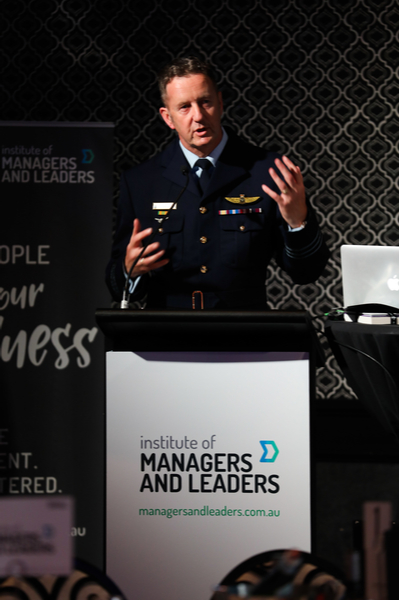Humans are hardwired to resist uncertainty. It’s no wonder change can be daunting even for some of the most resilient people – those in the defence force.

In 2018, the Department of Defence released the Transition Taskforce report, that estimates around 5,500 to 6,000 members of the defence force leave active service annually. That means thousands of men and women make a life-changing transition every year.
The same report reveals that a significant barrier to an effective transition is feeling unprepared, or ill-equipped to manage the differences between the military and civilian environments.
It’s a common feeling. “There’s always that fear, I know I felt it when I made the change when I left the Royal Air Force,” recalls Paul Hughes CMgr FIML, former Officer Commanding 3 Wing Australian Air Force Cadets and now a client relationship manager for Converge International, one of the largest employee assistance providers in Australia.
“I think it’s because it’s perceived as two different worlds, the military and the ‘civvy’ (civilian) world. But they’re more similar than what people imagine.”
Minding the gap
And where there are differences in these two worlds, it seems veterans simply need to validate the skills they already gained in service.
That’s what Ben Urquhart CMgr AFIML, a communications electronic technician for the RAAF who later secured leadership roles at Saab Australia, Ultra Electronics and Kongsberg Defence Australia, discovered.

“One of the challenges coming out of service was that I didn’t know how to talk to civilians,” says Urquhart. Not that he lacked communication skills, but he had to adjust his style to suit a new audience – one that didn’t have the military mindset. Urquhart points out that it was “the communication skills to motivate people,” that he crucially needed.
Urquhart looked towards leadership skills development to close that gap and completed a diploma course. However, he reached a stage in his career where classes just weren’t enough. “I considered doing an engineering degree but quickly realised that I wanted to stand out for my management and leadership skills, not my technical skills,” says Urquhart. So Urquhart applied to become a Chartered Manager, the highest accreditation available for managers and leaders.
Hughes believes this is a vital step for those wanting to validate their skills as they exit the defence force. “Accrediting your skills is a key move. It’s about realising your worth and value, knowing what you can bring to the table and getting formal recognition for it,” says Hughes.
Three tips on making a successful transition
Both Urquhart and Hughes believe that there are many practical steps to take if you want to make a successful career transition into the civilian workplace.
- Network with non-military professionals. Urquhart has thoroughly enjoyed networking with leaders from different industries as a member of the Institute of Managers and Leaders Australia and New Zealand (IML ANZ). It has opened his mind to the way others have achieved success. Plus, the Transition Taskforce report lists establishing new networks as one of the ways to enable a successful transition into civilian life.
- Accredit your skills. Neither Hughes nor Urquhart completed a degree, but that didn’t stop them from becoming successful and respected leaders. Hughes believes that by obtaining a designation, such as Chartered Manager, you gain clarity on your professional ‘mission’. It helps you become a leader who continually develops their knowledge and competence while empowering you to make a positive impact on others.
- Build up your courage. Hughes observes that the military provides its people with excellent leadership skills training. So veterans often enter the non-military world already equipped with sought-after leadership skills. Formal recognition of those skills can give you the courage you need to back yourself. Remember, to foil fear you need courage.
The business world needs better leaders
Find out how you can accredit your leadership skills and gain confidence and courage. Take the Chartered Manager eligibility quiz now.



